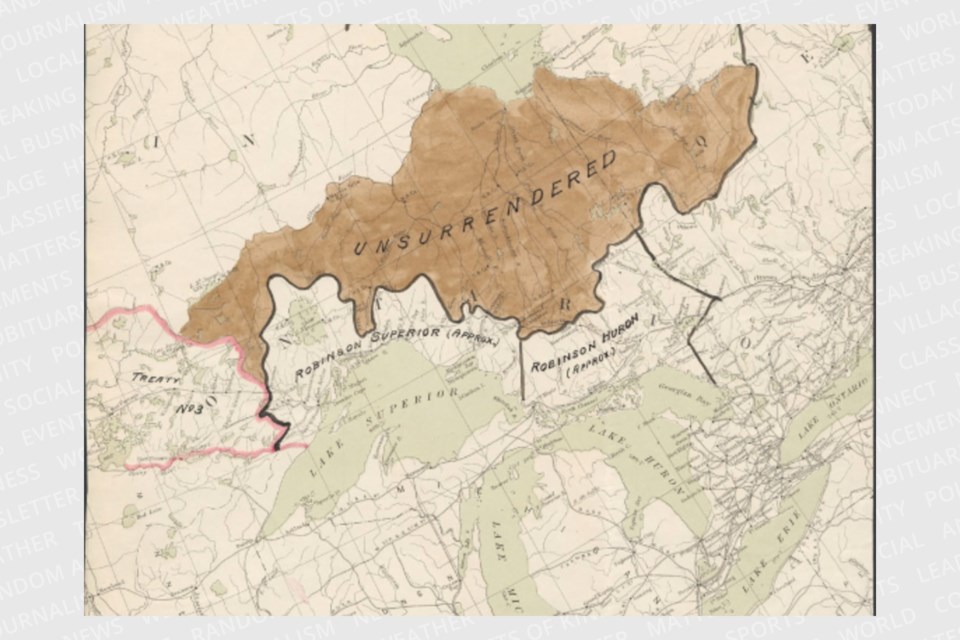The Robinson Superior Treaty annuities trial continued this week as Eric Kirzner, professor emeritus of finance at the University of Toronto’s Rotman School of Management, took the stand in a Sudbury courtroom to provide expert testimony on behalf of Canada.
Kirzner, who produced a report with fellow Rotman finance professor Laurence Booth to be entered into the trial as evidence, was pelted with questions by lawyers representing nine of the Robinson Superior bands over hypotheticals regarding how Anishinaabe communities along Lake Superior would have invested their money if the treaty annuities had actually been increased over time.
Signatories to the Robinson Superior Treaty and the Robinson Huron Treaty — a pair of identical treaties signed in 1850 — have been in court fighting for an increase to treaty annuities for years.
While both cases have been heard in court simultaneously, Robinson Huron Treaty representatives are currently engaged in confidential settlement negotiations with both Ontario and Canada.
After the first two stages of the trial, Ontario Superior Court Justice Hennessy ruled that the federal and provincial governments had to pay an increased annuity to both treaty groups that reflected a “fair share,” so long as there were enough resource-based revenues to do so without incurring a loss.
In both, the province’s Court of Appeal mostly upheld those decisions.
But while the federal government let both rulings stand, the Province of Ontario is taking the decisions to the Supreme Court of Canada.
Both groups are seeking billions of dollars in compensation after almost 150 years of receiving small annual payments in return for ceding much of Northern Ontario to the Crown.
The third stage of the treaty annuities trial, taking place at the University of Sudbury, will eventually determine the amount of compensation and which Crowns will be on the hook to compensate treaty beneficiaries.
This week, reports by Kirzner and Booth were called into question by Robinson Superior Treaty legal counsel for using a “representative sample” — with guidance from Department of Justice Canada — of band trust account summaries from 1880 to 1957 in an effort to determine First Nations spending and investment patterns throughout the years.
Kirzner told the court that he and Booth went with a representative sample in the name of efficiency only because there was a “huge amount” of data to comb through. He also conceded that guidance from the justice department played a role in that decision.
“Well, they’re the ones who pay the bills,” Kirzner said, when cross-examined by Harley Schacter, legal counsel for Whitesand and Red Rock First Nations, about receiving guidance from Canada to go ahead with the representative sample approach.
But that wasn’t the only concern with the reports: lawyers for the Robinson Superior Treaty First Nations maintained that only statistics from even years were used, band financial accounts outside of government trust accounts were not taken into consideration, and spending data beyond 1956 was replaced with a mathematical average based on the finance experts' assumption that the data would be similar to band spending in prior years.
Lawyers for Robinson Superior Treaty communities were especially concerned with Kirzner and Booth using spending data from both Robinson Superior Treaty (RST) and Robinson Huron Treaty (RHT) First Nations. In all, band trust account summaries from 16 communities were used — less than half of which came from Robinson Superior Treaty communities.
“Why do you believe that the RHT territory bands are representative of RST bands?” Schacter asked Kirzner.
“Both were included in this action,” Kirzner replied, adding that the sample was representative of how First Nations spent its funds back in the day.
Booth, who co-authored the reports alongside Kirzner, is expected to testify in court this week.
